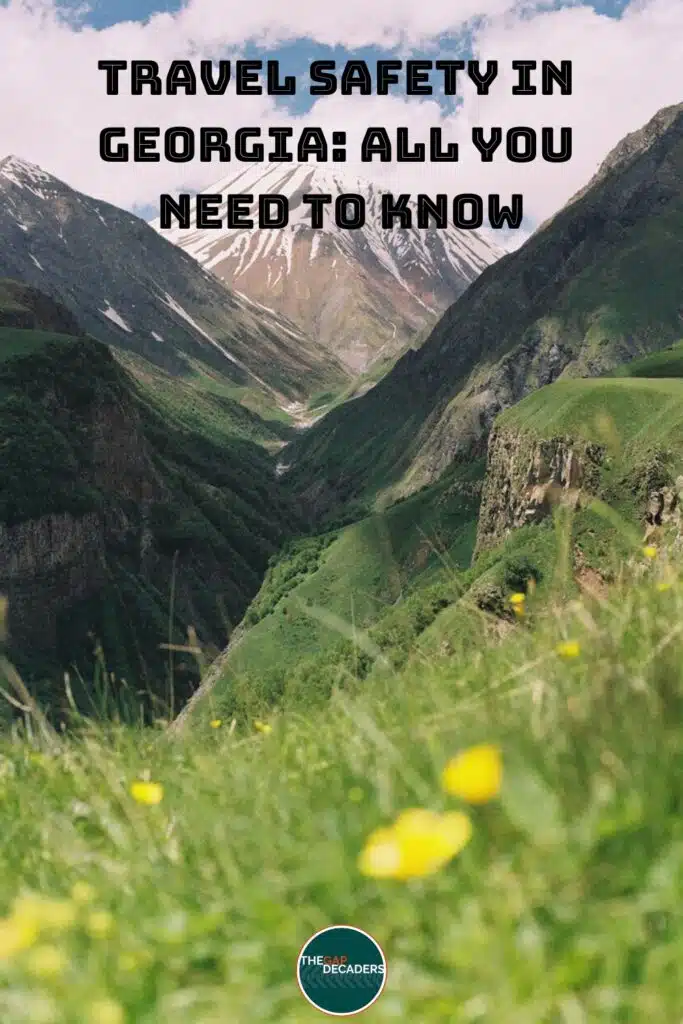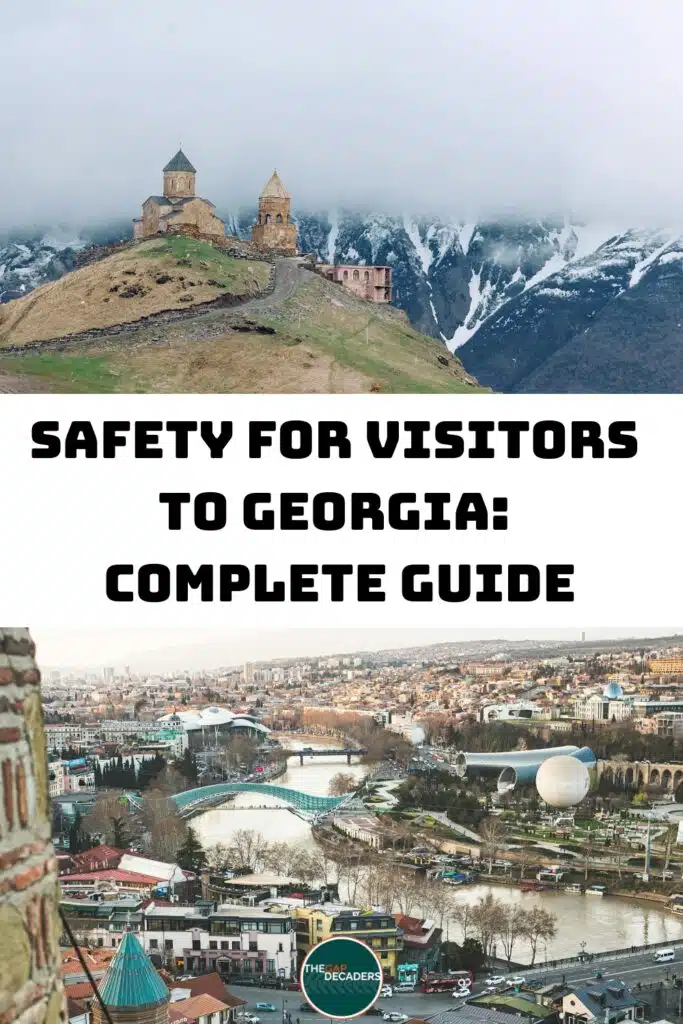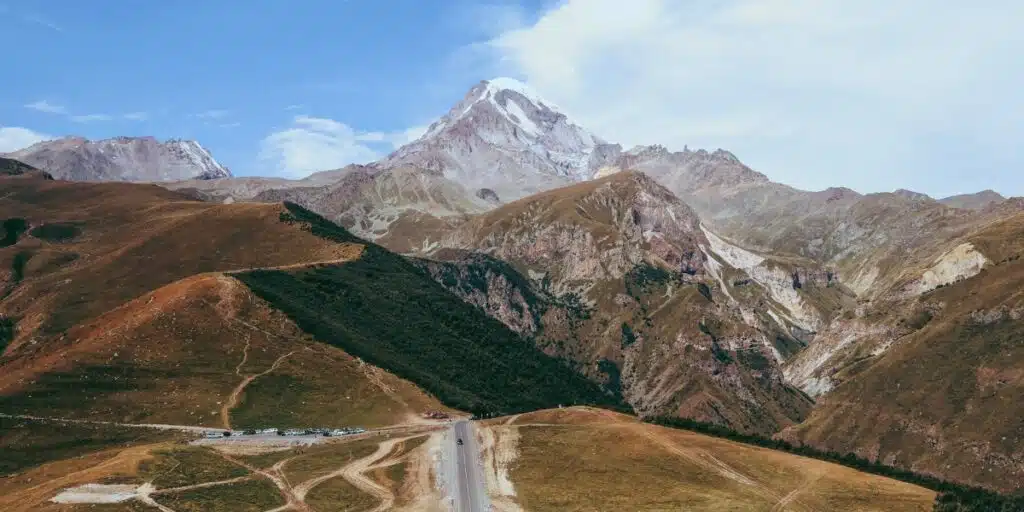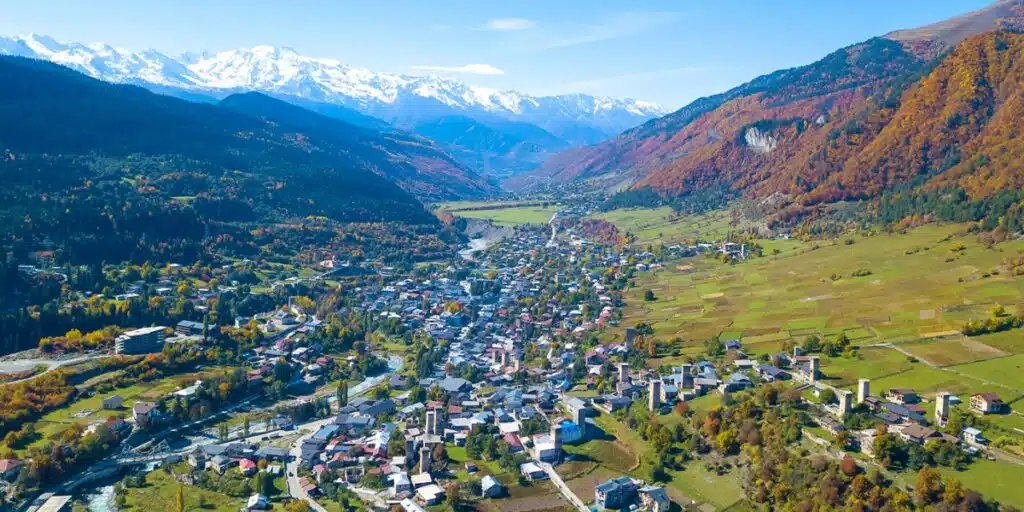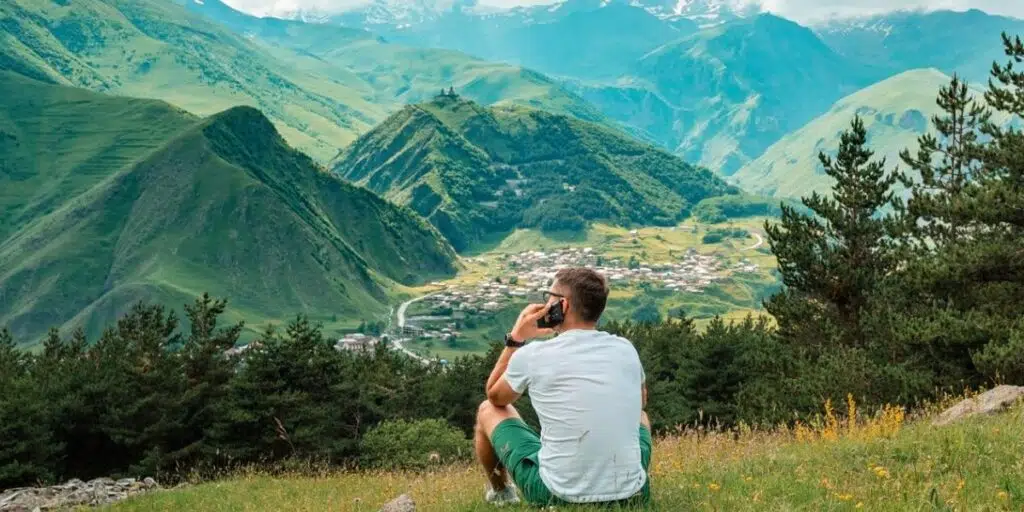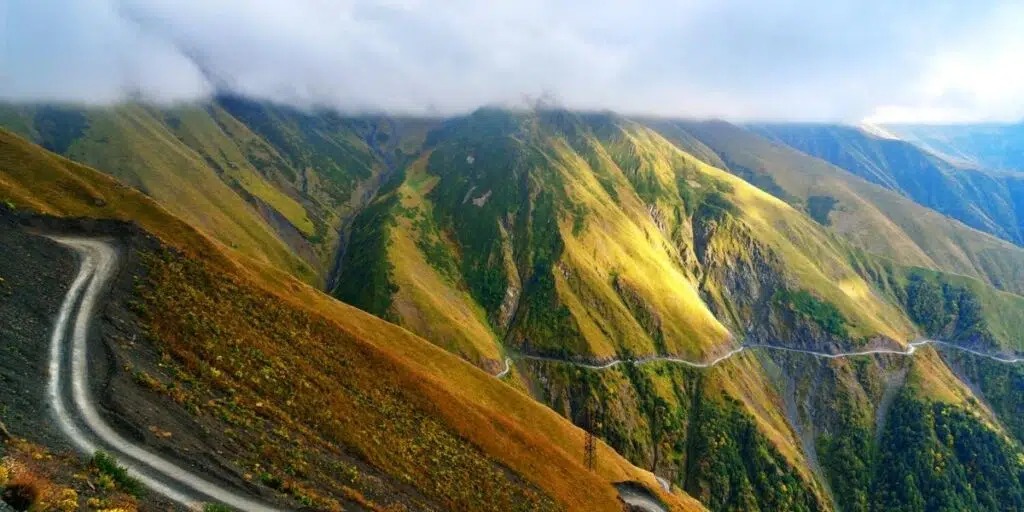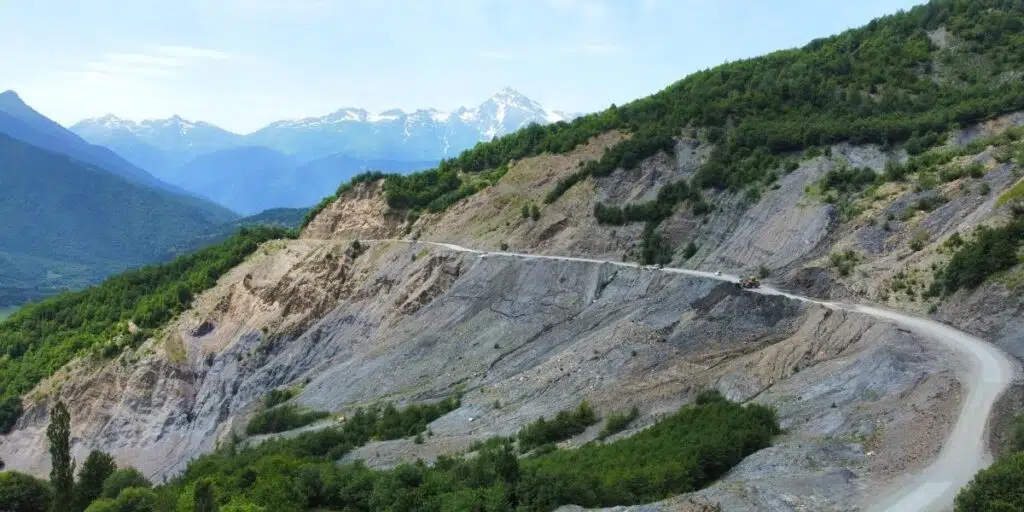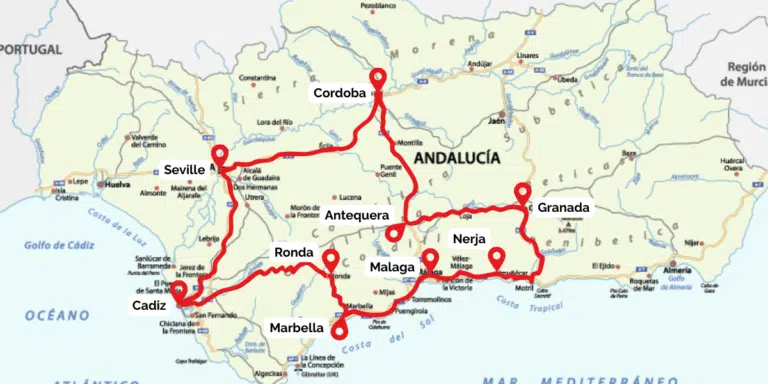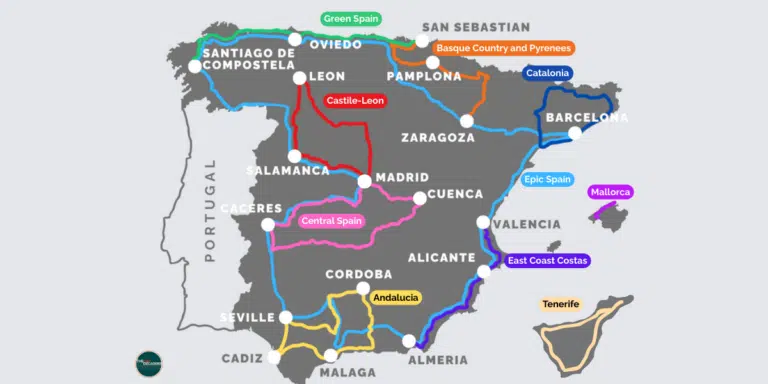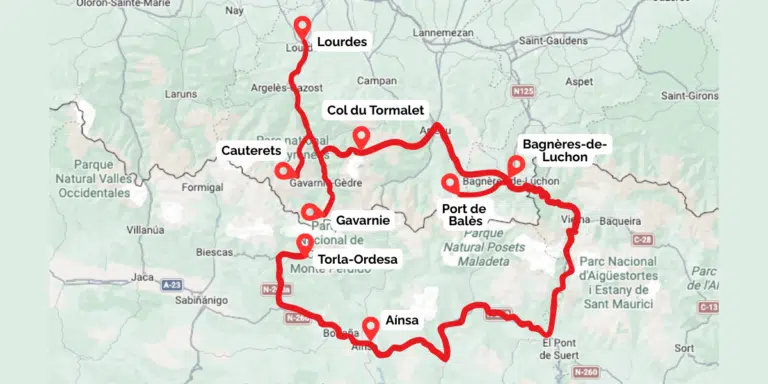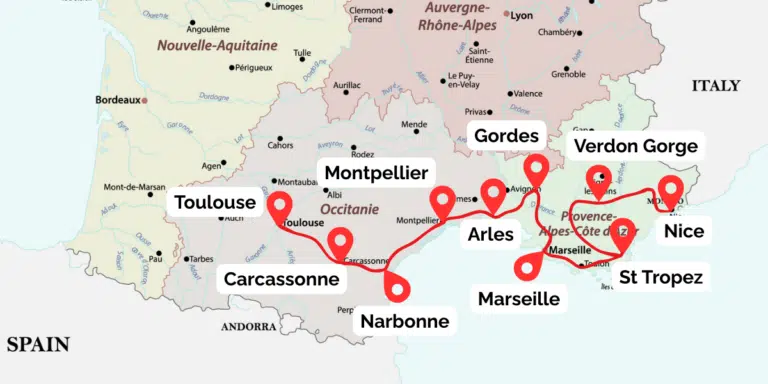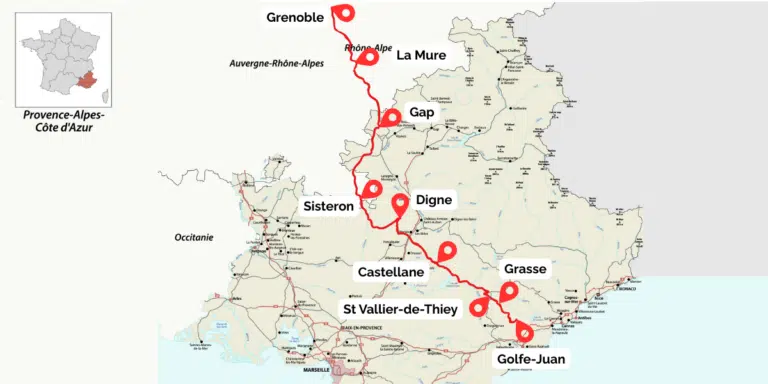This post may contain affiliate links, from which we earn an income. Click here to read our affiliate policy.
With its unspoiled mountainous landscapes, complex history, and vibrant culture, Georgia has become an increasingly popular destination for adventurous travelers to the Caucasus. However, safety is a common concern for many and it’s a question that is often asked by fellow travelers.
We spent over three months traveling to the four corners of Georgia, from Mestia in the Upper Svaneti, Kazbegi on the Russian border, the beaches of the Black Sea, and the capital city of Tbilisi. We felt safe the entire time, but we were well prepared.
In this comprehensive guide, we’ll explore the safety aspects of travelling to Georgia and provide valuable tips and travel advice to ensure your journey is secure and enjoyable.
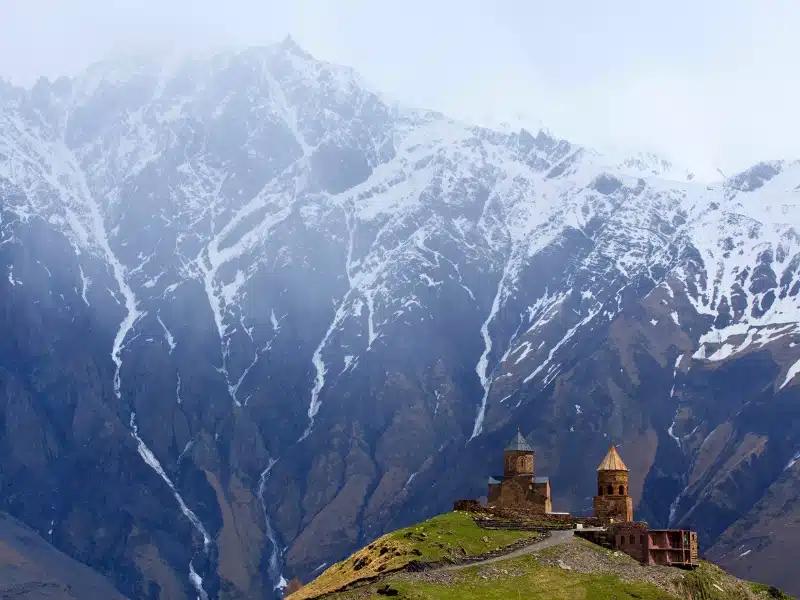
Is Travel to Georgia Safe?
Georgia is generally safe for travelers, with low crime rates and friendly locals who are often eager to help visitors. While there are some areas and activities that may require extra caution, most of the country is safe for tourists.
Violent crime is rare, and petty crime, such as pickpocketing, is more common in crowded areas. If you exercise normal precautions, you can enjoy a safe trip to Georgia.
According to the World Population Review, Georgia’s crime index is 25.7 crimes per 100,000 people annually. In comparison, the US crime index is 49.2, and the UK stands at 46.9. So, despite Georgia’s sometimes poor safety reputation, statistically, it is actually almost twice as safe as both America and the United Kingdom.
Is this your first time visiting Georgia? Get all the information you need in our Georgia Travel Guide, including what to pack, the best time of year to go, getting there and practical tips to help you have the best trip!
Georgia Travel Safety Tips
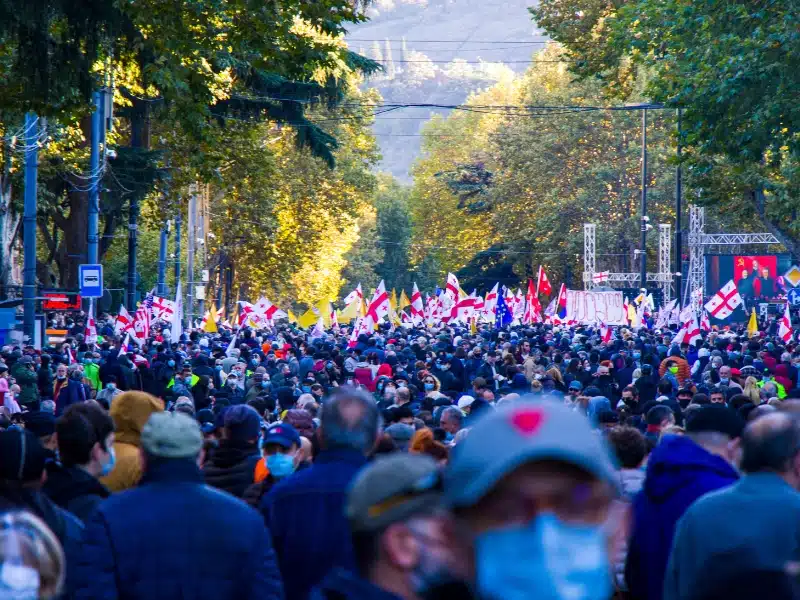
What Do You Need to Travel to Georgia?
Before traveling to Georgia, ensure you have the following:
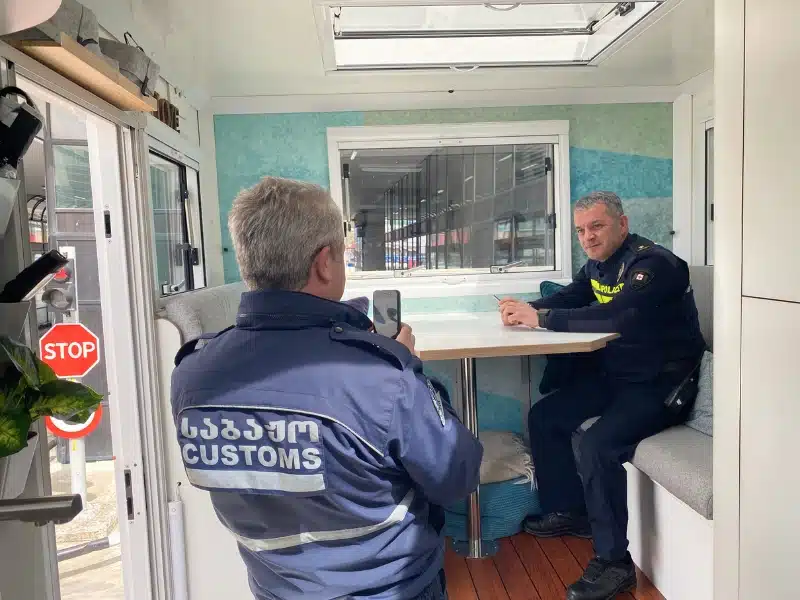
Russian Occupied Territories in Georgia
The administrative boundary lines between Georgia, South Ossetia, and Abkhazia are not very well defined and change regularly. The Russian military and border guards regularly patrol the boundary lines, and you could be detained and arrested if you cross into South Ossetia and Abkhazia, even if it’s by accident.
Tensions are high in both occupied regions. Unexploded landmines are a risk where military operations have occurred, especially in areas along the administrative boundary lines with South Ossetia and Abkhazia and near the border with Azerbaijan at the Red Bridge south of Rustavi.
Keep an eye on your government’s travel advisories for up-to-date information about this ever-changing situation.
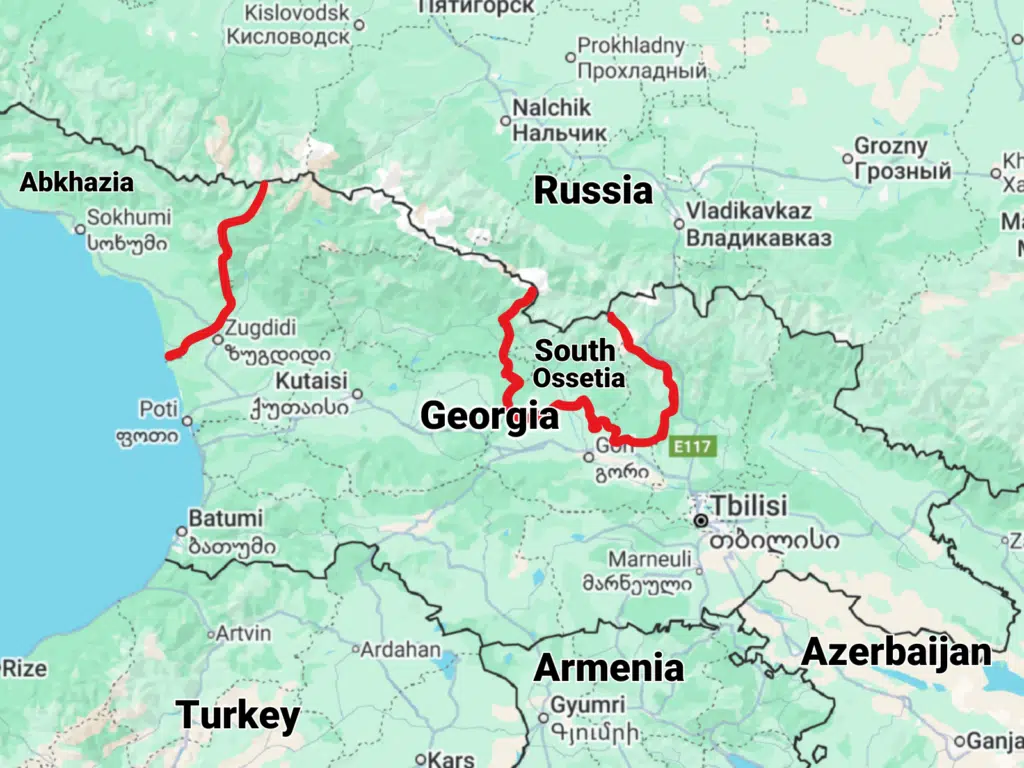
Medical Services in Georgia
The country of Georgia has made considerable progress in its healthcare system, providing both public and private medical services for travelers. Here’s an overview of what you can expect:
Emergency Medical Services
The general emergency number is 112, which covers medical emergencies, fire, and police services.
Ambulance services are available in major cities and can be dispatched by dialing 112. However, response times might be slower in rural areas.
Public Hospitals & Clinics
Public healthcare facilities in Georgia provide basic medical services, but the quality can vary, especially outside of major cities like Tbilisi, Batumi, and Kutaisi.
English-speaking staff may not always be available, particularly in rural areas. However, it’s easier to find English-speaking doctors in major cities.
Public healthcare is generally more affordable than private care, but travelers are usually expected to pay for services. Travel insurance may cover some of these costs.
Private Hospitals & Clinics
Private hospitals and clinics in Georgia offer higher standards of care with modern equipment and facilities. Many doctors in private clinics have trained abroad.
Private facilities often have English-speaking staff, making them more accessible for travelers.
Private medical care is more expensive than public healthcare but still relatively affordable compared to Western and European countries. Most private facilities accept major international health insurance plans.
Pharmacies
Pharmacies are widely available in cities and towns, offering prescription and over-the-counter medications. Common medications are usually available, but it’s wise to bring any specific medications you might need.
Some pharmacists speak English, especially in urban areas, and you can also use a translation app on your phone.
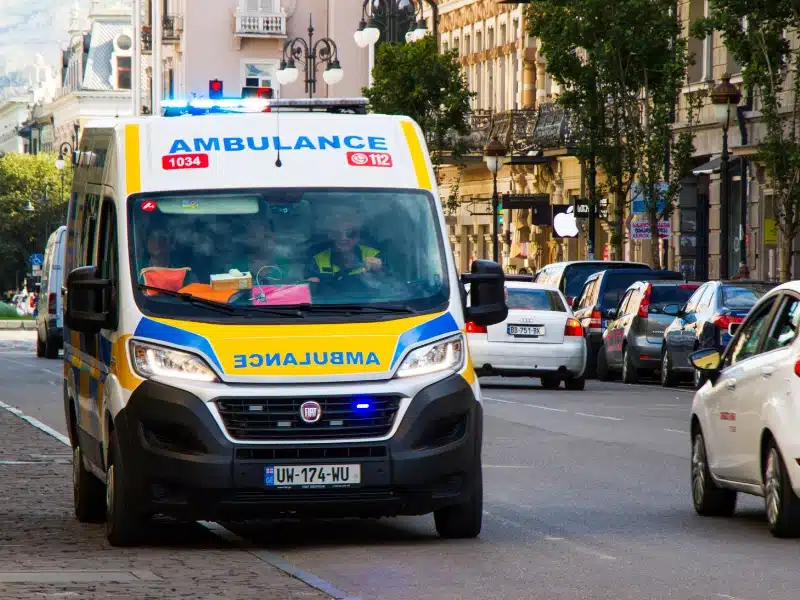
Make sure you have travel insurance you can trust when visiting Georgia. We recommend True Traveller for their 5-star TrustPilot reviews, variety of cover options, best activities cover as standard, great prices, and excellent service.
Common Scams in Georgia
While Georgia is a safe and welcoming country for travelers, it’s always wise to be aware of potential scams that could disrupt your trip. Here are some common scams to watch out for and tips on how to avoid them:
Fake Tour Guides
One of the most common scams in Georgia involves fake tour guides. These individuals typically approach tourists at popular attractions, offering their services as guides.
Guides might initially seem knowledgeable and friendly but often provide poor-quality tours or demand higher fees than agreed upon.
Always use licensed tour guides or book tours through reputable agencies like Get Your Guide. Ask the guide for identification or proof of certification.
Overpriced Services
Another frequent issue is being overcharged for services, particularly by taxi drivers and street vendors. Tourists might be quoted exorbitant prices for rides or goods, especially if they appear unfamiliar with the local currency or standard rates.
Agree on a fare before starting a taxi journey, or insist the driver use the meter. A good alternative is a taxi app like Taxi Tbilisi, Bolt, or Maxim Taxi.
Use apps like Google Maps to estimate travel distances and expected fares and familiarize yourself with common prices for goods and services to avoid being overcharged.
Fake Currency Exchange
Tourists exchanging money at unofficial places might receive counterfeit currency or an unfair exchange rate. Some street exchangers might offer attractive rates but then trick you with a sleight of hand or give you fake money.
Only use official exchange bureaus, banks, or ATMs for currency exchange. Count your money carefully on receipt and check for any signs of counterfeit notes.
Restaurant Overcharging
In some cases, tourists have reported being overcharged at restaurants. This can happen when prices aren’t clearly listed or if items are added to the bill that weren’t ordered.
Check the menu and prices before ordering. Pay attention to what you ordered and verify that everything on the bill matches your order before you pay.
Bogus Charities and Beggars
While not unique to Georgia, bogus charities and beggars are another scam to be aware of. Tourists may be approached by people claiming to represent a charity or by beggars with heart-wrenching stories, sometimes involving children.
If you want to help, donate to recognized charities rather than giving money directly to individuals on the street. If you are approached, politely decline and walk away if you feel uncomfortable or unsure about the situation.
Bar Scams
This scam involves so-called promo girls contacting tourists in Tbilisi through social media and arranging to meet them in various clubs across the city.
Once in the bar, the promo girls order food and wine for their tourist guests, who are later presented with a highly inflated bill. If the guest refuses to pay, they are intimidated and suffer psychological pressure, forcing them to pay.
Unofficial Parking Attendants
In some tourist areas, unofficial parking attendants might ask for a fee to ‘watch your car.’ These individuals may not have any official role and could disappear after taking your money.
Park in official, designated parking areas whenever possible. If you are asked to pay for parking, verify that the person is an official attendant and check for posted signs indicating parking fees and procedures.
Accommodation Scams
Tourists booking accommodations online may occasionally fall victim to fake listings or misleading descriptions.
Arriving at your destination only to find that your accommodation doesn’t exist or isn’t as advertised can ruin your trip. Only use reputable booking platforms with verified reviews and secure payment options.
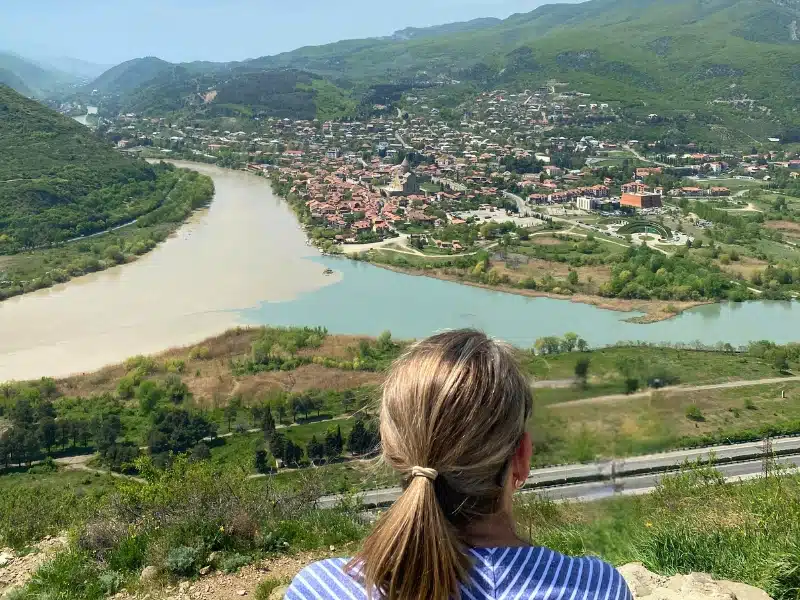
Georgia Travel Inspiration
Traveling Safely Around Albania
Traveling around Georgia can be an adventure in itself. Here are some tips to ensure you do so safely:
Renting a Car
When you hire a car to drive in Georgia, inspect the vehicle thoroughly (in daylight) on the collection and document any damage to the car that hasn’t been done previously, promptly sharing this information with the car hire company. Also, ensure the correct fuel levels have been marked on the paperwork and that the car is what you ordered.
You should take out coverage for the excess you’d be responsible for in case of an accident. This car hire excess insurance can typically be included during the booking process, upon car collection, or through a third-party provider like Insurance4CarHire, which often offers a more cost-effective option.
We recommend hiring your car with Localrent.com, an aggregator of local car rental companies. They work with small car rental companies that only operate in their location and closely monitor the quality of their service. This means you get the best service for the lowest price.
You may need a 1949 or 1968 International Driving Permit to drive in Georgia. We are UK/Irish citizens and were not asked for an IDP during our stay, but we understand that US citizens may need a permit to hire a car.
Road Conditions
The standard of roads across Georgia is fairly poor. There are many potholes, dangerous verges, raised and sunken manhole covers, disintegrating roads, and multiple surface types, from tarmac to reinforced roads and unsealed tracks.
Sometimes, the tarmac just disappears, leaving large potholes and craters full of rubble or gaping holes at the sides of roads. This is particularly disconcerting when there is a sheer drop into a river or ravine below! This type of extreme weather damage is often passable with a little caution, but if you’re unsure, get out and have a good look around, checking the road surface carefully.
You can road trip the whole of Georgia in a two-wheel drive vehicle as long as you deploy common sense. Good ground clearance, robust tires, good suspension, and confident driving are requirements, along with the proviso that you’ll only be able to road trip in the summer months and when it’s dry.
There are a couple of exceptions to this. The roads to Georgia’s remote mountain villages of Tusheti and Khevsureti and within the Vashlovani Protected Areas all require 4WD to navigate safely. You’ll need to have experience driving a 4×4 vehicle and be a confident driver to tackle the roads in these remote areas.
Georgian Drivers
Georgia drivers flip between overtaking you at speed on a blind bend and driving painfully slowly. They will often not stop at pedestrian crossings or intersections, use the horn repeatedly even though it’s clear you can’t move, drive down the middle of the road, and park in the most inappropriate places.
In other words, they’re bullish and aggressive, which is at odds with the usual character of Georgian citizens. Expect the unexpected, pay attentionand understand that drivers in Georgia don’t know how to use their mirrors or indicators, and you’ll be fine!
Motorhomes & Campervans
We traveled through Georgia in our overland truck, meeting many van lifers and motorhomers. We camped off-grid and also used campsites across the country. If you’re concerned about safety, use an app like Park4Night or iOverlander to check out reviews.
You can also hire 4×4 campers and cars in Georgia, which is becoming a really popular way to see this diverse country. We recommend Overlando, which specialises in self-driving overland adventures and has several four-wheel-drive options for your trip.
Public Transport
While Georgia’s public transport system is not as developed as in some other European countries, it provides a practical and often interesting way to explore the country.
While public transport is generally safe, keep an eye on your belongings, especially in crowded buses and marshrutkas. For longer journeys, consider carrying snacks and water.
Buses
These are two main bus companies in Georgia, Metro and Georgian Bus.
Metro buses travel between Ortachala Central Bus Station in Tbilisi and Odyssey Dimitriadis 3 in Batumi, with up to ten daily departures. The journey takes 6-6.5 hours and provides Wi-Fi, charging points, personal HD monitors, and hot drinks and water.
Georgian Bus routes start at the Didube Bus Station and go to Kutaisi, Batumi. Georgian Bus also offers a bus and fly option for Gudauri, Stepantsminda (Kazbegi), and Sighnaghi.
Shared Taxis & Minibuses (Marshrutka)
Marshrutka are privately operated minibusses and taxis offering a more flexible and quicker option than regular buses. They typically leave when full and can be found at bus stations or main squares. Marshrutka are especially useful for reaching smaller towns and rural areas not served by larger buses.
Marshrutka often do not have fixed schedules and depart when they have enough passengers. Ask locals or your accommodation or check online forums for updated information on routes and departure times.
Trains
Trains in Georgia are a mix of slow, old Soviet engines and newer, faster, and more expensive trains. Georgian Railway trains connect Tbilisi with other major cities, including Batumi, Zugdidi, Gori, Poti, and Kutaisi Airport.
Taxis
Taxis are readily available in most cities and towns and are a convenient option for short trips or when public transport is unavailable. Look for licensed taxis with a taxi sign and a meter. In Tbilisi, for example, official taxis are only allowed to be white.
If the taxi does not have a meter, always agree on the fare before starting your journey. This helps avoid misunderstandings or being overcharged. Alternatively, you can use a taxi app like Taxi Tbilisi, Bolt, or Maxim Taxi.
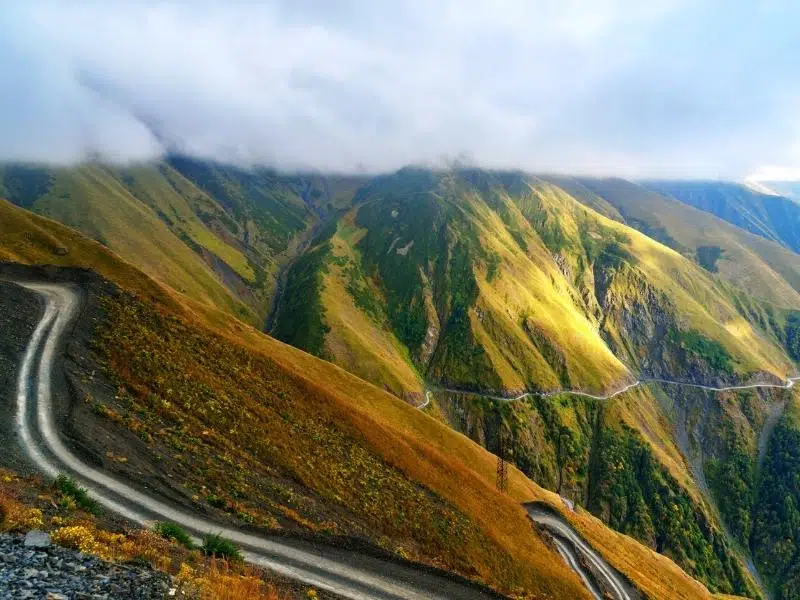
Are you planning a road trip in Georgia? Get our guide to the best Georgia road trip routes for info and tips + maps and nearby attractions so you don’t miss a thing!
Are you looking for more European travel ideas? Check out these top posts…
Andalucia Road Trip: The Perfect 10-14 Day Itinerary
Spain Road Trip: 10 of the Best Routes, Regions, and Island Drives
Pyrenees Road Trip & Hiking Itinerary: 7–9 Days with an Optional Spain Extension
South of France Road Trip: The Ultimate 10 Day Driving Route
Route Napoléon: Following Napoleon Through the French Alps
Route des Grandes Alpes: An Epic French Road Trip
Love it? Pin it!
